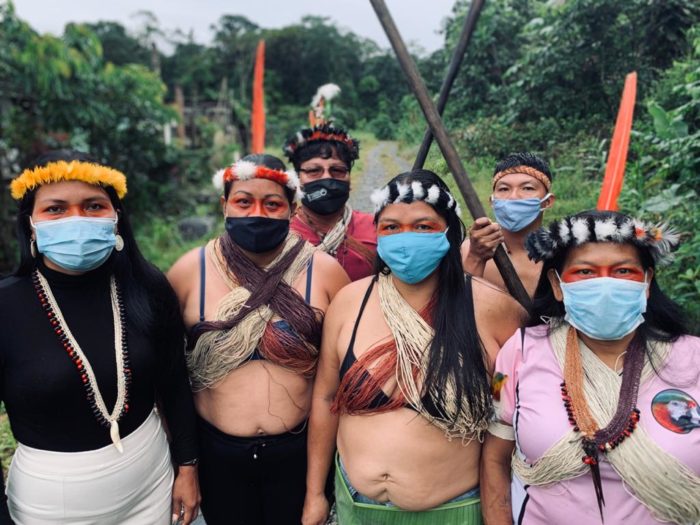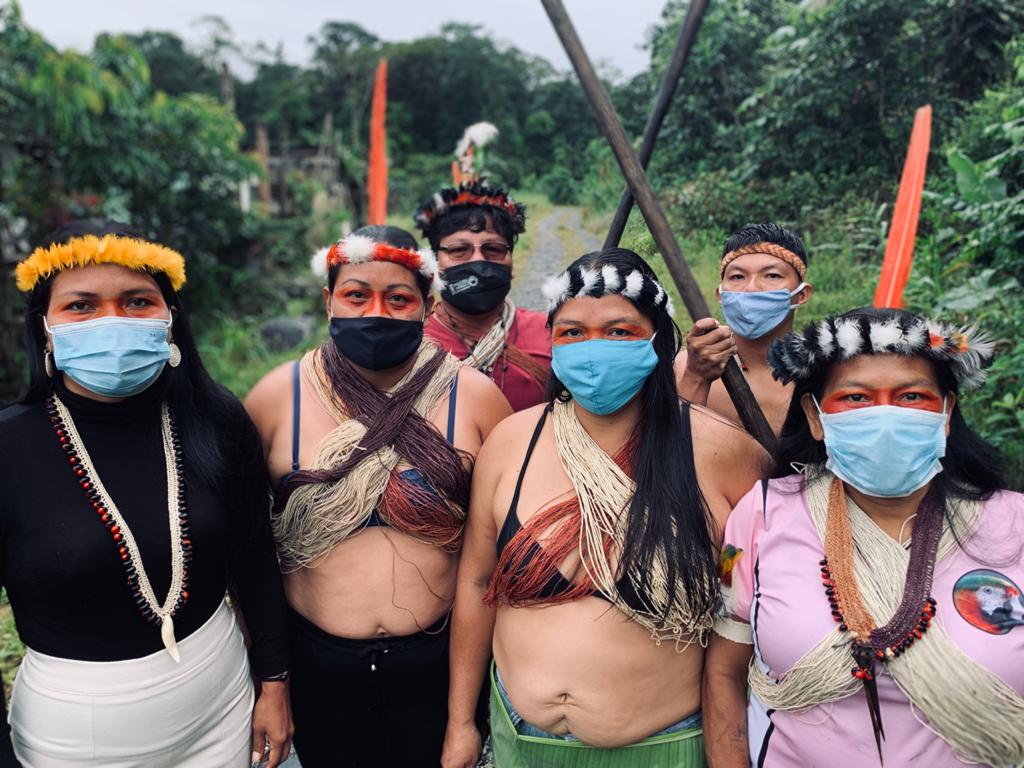Science and an abundance of evidence through history makes it clear that keeping forests standing is absolutely critical to successfully confronting the climate crisis, as well as avoiding future pandemic outbreaks like Covid-19. Tellingly, though Indigenous Peoples comprise just five per cent of the world’s population, the lands they steward protect a stunning eighty percent of life on earth. Simply put, the most effective, efficient and ethical way to protect forest ecosystems is to defend the land rights of the Indigenous and frontline communities that have guarded and maintained them for generations. The undeniable reality though, is that even well before the coronavirus pandemic began wreaking havoc on societies and economies around the planet, Indigenous land defenders around the world have been living under siege. And now, with government oversight loosened, the pandemic is causing a worldwide spike in deforestation.
Aggressive industrial expansion for agriculture, mining and oil development, combined with poor government law enforcement has led to disastrous results, especially within the belt of tropical forests that includes the Amazon, the Congo and Southeast Asian forests like those in Indonesia. Land grabbing, intimidation and even widespread assassinations of community leaders are long standing crises that tragically have been on the rise.
Now, the multiple threats posed by Covid-19 have combined to rapidly amplify the challenges facing these forest peoples, posing an existential threat to many already vulnerable communities. But, amidst the bleak picture of this multi-pronged assault are many hopeful stories of dignified resistance, international solidarity and remarkable resilience.
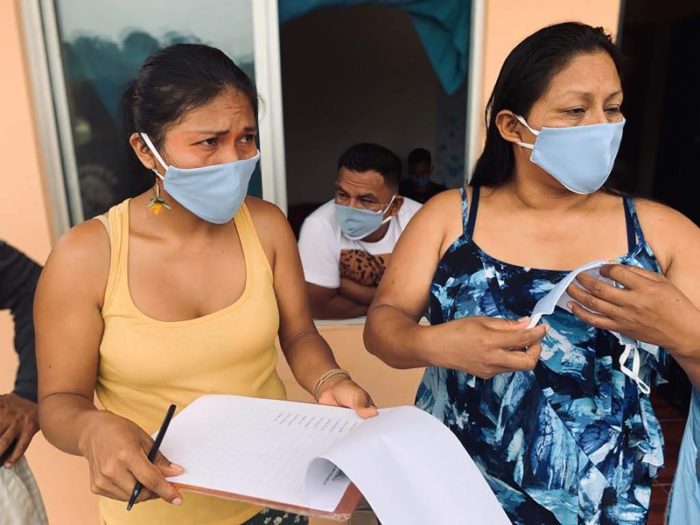
The Community Action Grant Program at Rainforest Action Network exists to provide direct support to grassroots leadership on the frontlines of the climate crisis. Like nearly everything else in the world, the focus of this program has been forced to adapt to the rapidly unfolding new reality created by this pandemic and so our program has pivoted to quickly funnel hundreds of thousands of dollars towards health programs and related needs caused by the novel coronavirus. Following is a brief report back from several recent grant recipients across the Amazon showcasing innovative examples of how Indigenous communities have pivoted their priorities amidst shifting circumstances, and how international solidarity has helped provide them the tools to do so.
Ecuadorian Amazon: Amazon Frontlines and the Ceibo Alliance
Amazon Frontlines and its Indigenous partners at the Ceibo Alliance have mobilized immediate action in two phases: infection prevention through targeted communication initiatives and the creation of an emergency response fund. One of the biggest challenges Indigenous communities face is the lack of access to critical information about Covid-19. Amazon Frontlines worked with local and regional Indigenous federations to produce informational materials in Indigenous languages in various formats to ensure greater dissemination to even the most remote communities.
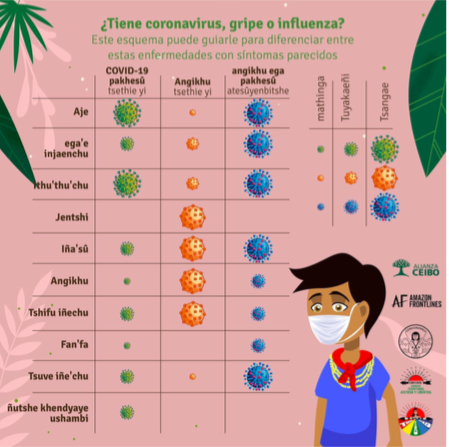
Amazon Frontlines has found it very effective to purchase radio spots on local stations, as well as producing pamphlets to send to communities, and sharing information and targeted ads across social media. In the face of government inaction it has also been necessary to take legal action. The Waorani Nation, with 2 people, including an elder, already having died as a result of Covid-19 and facing the threat of further spreading of the disease from ongoing oil operations and illegal logging on their territory, secured a favorable ruling from the Provincial Court of Pichincha that granted partial precautionary measures requiring the Ecuadorian government to take urgent actions to contain the virus in Waorani territory.
Amazon Emergency Fund
In response to the urgent and growing threats to the Amazon and its people, NGOs, donors and advisors, as well as international, national and local funds, are collaborating to raise and channel funds directly to Indigenous and forest communities and grassroots organizations facing the Covid-19 emergency across the Amazon Basin. The Amazon Emergency Fund is a newly-formed donor collaborative working in close coordination with COICA (Coordinating Body of Indigenous Peoples of the Amazon Basin) and its 9 national Indigenous organizations, as well as partners and allies across the Amazon and around the world, to support emergency Covid-19 response.
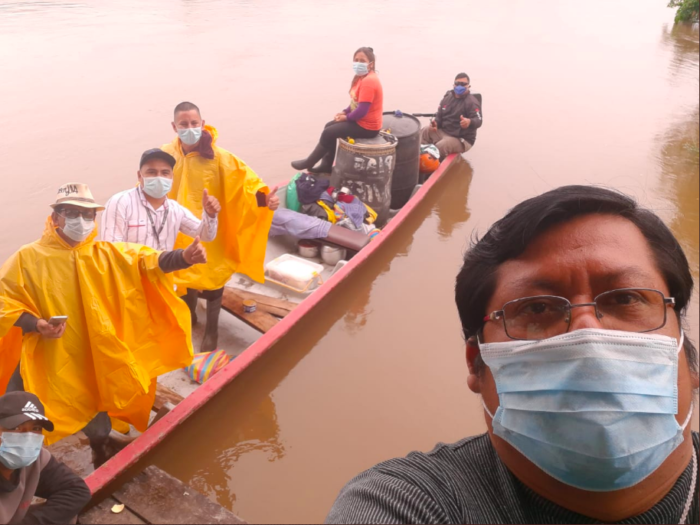
Donations to the fund are steered toward rapid response grants for urgent and immediate prevention and care; food and medical supplies; emergency communications and evacuation; protection and security for Forest Guardians; and food sovereignty and community resilience.
Peruvian Amazon: Nuevo Ponderosa and Nueva Alianza Shawi Villages
As with many other Indigenous communities throughout the Amazon, the history of the Shawi Indigenous people of Peru includes devastation caused by disease and forced labor during colonization, brutal conditions during the expansion of rubber plantations, and threats from land invaders, illegal loggers and gold miners and agribusiness. All of this creates a dangerous situation for remote Shawi villages as they face the current threat from the Covid-19 pandemic with minimal access to government assistance.
The Shawi Federation has been coordinating with the regional government to increase public health services to Shawi villages. International funds are aiding efforts to coordinate and train 4 Shawi youth leaders, from the villages of Nuevo Ponderosa and Nueva Alianza, to establish community first aid health centers in villages that are vulnerable due to the presence of outsiders in the vicinity. The project incorporates traditional and western medical supplies and provides education on necessary health protocols to keep Covid-19 from spreading among the villages and deeper into Shawi territory.
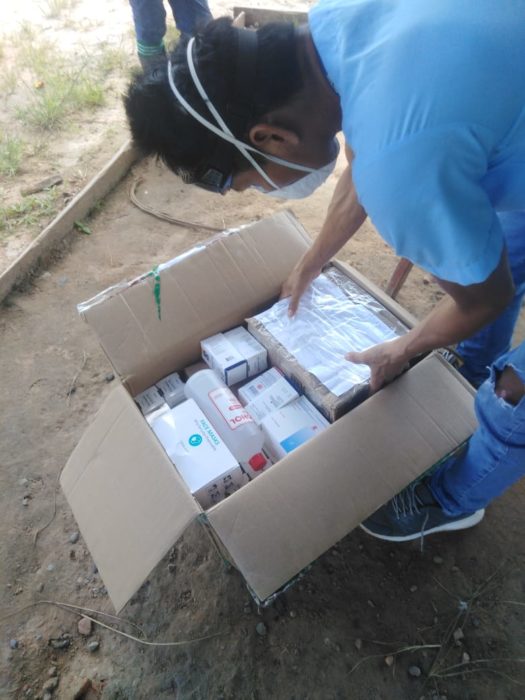
Brazilian Amazon: Munduruku Campaign and CASA Socio-Environmental Fund
The Munduruku, an Indigenous community fighting to protect its traditional territory in the Tapajós Basin of the Amazon from threats such as dams, waterways, railroads, soy ports and gold mining, have already suffered the deaths of 10 elders from Covid-19. In response the Munduruku are launching a campaign to secure resources to create their own health centers, ensure food security within their territories and to apply public pressure on the government.
Another critical response is coming from CASA Socio-Environmental Fund, which directs funding to Brazil’s influential grassroots environmental justice and Indigenous Peoples movements. CASA has been providing rapid response grants to provide emergency food and medical supplies, access to information about Covid-19, and to support community-led solutions and projects to both combat the pandemic and to reduce the socioeconomic impacts generated by the crisis, such as through food sovereignty initiatives.
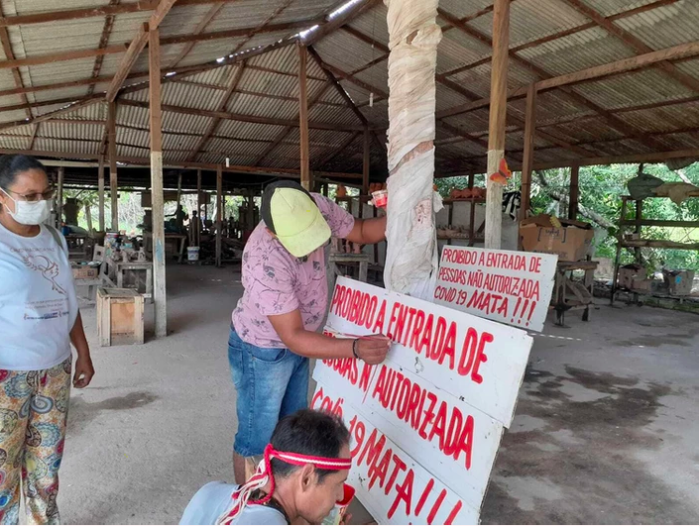
As the climate crisis continues to pose an accelerating threat to societies and economies across the planet, it is more clear than ever that the basic human rights and ways of life of Indigenous Peoples must be defended at all costs. As individuals, organizations and governments, we must all seek out and engage in effective strategies to resist the pervasive exploitation and land grabbing bearing down on Indigenous Peoples. For thousands of years these land-based communities have fostered ecological resilience while amassing invaluable knowledge of plants and medicines as well as informed approaches to living with the earth in ways that leave healthy ecosystems and abundant resources available for generations to come. The fate of our finite world unites all of us in a common cause. Now we have to start to act like our lives depend on it, because they do.
